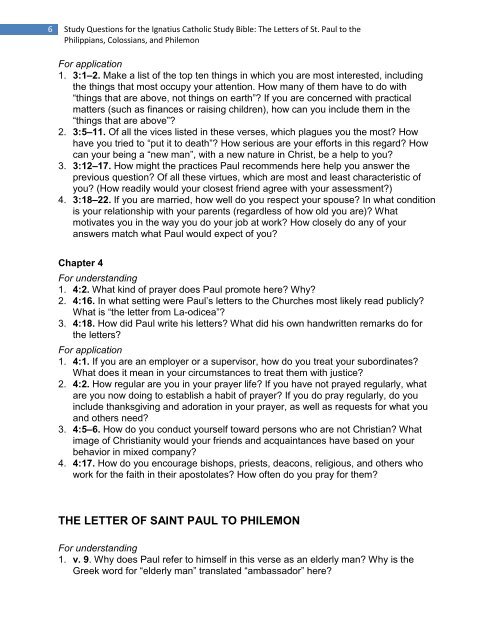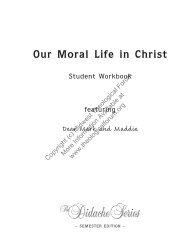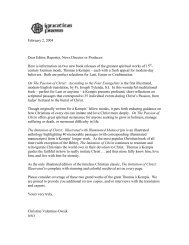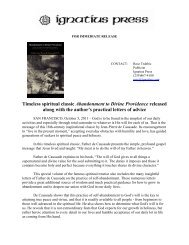Philippians, Colossians, and Philemon - Ignatius Press
Philippians, Colossians, and Philemon - Ignatius Press
Philippians, Colossians, and Philemon - Ignatius Press
You also want an ePaper? Increase the reach of your titles
YUMPU automatically turns print PDFs into web optimized ePapers that Google loves.
6 Study Questions for the <strong>Ignatius</strong> Catholic Study Bible: The Letters of St. Paul to the<strong>Philippians</strong>, <strong>Colossians</strong>, <strong>and</strong> <strong>Philemon</strong>For application1. 3:1–2. Make a list of the top ten things in which you are most interested, includingthe things that most occupy your attention. How many of them have to do with“things that are above, not things on earth”? If you are concerned with practicalmatters (such as finances or raising children), how can you include them in the“things that are above”?2. 3:5–11. Of all the vices listed in these verses, which plagues you the most? Howhave you tried to “put it to death”? How serious are your efforts in this regard? Howcan your being a “new man”, with a new nature in Christ, be a help to you?3. 3:12–17. How might the practices Paul recommends here help you answer theprevious question? Of all these virtues, which are most <strong>and</strong> least characteristic ofyou? (How readily would your closest friend agree with your assessment?)4. 3:18–22. If you are married, how well do you respect your spouse? In what conditionis your relationship with your parents (regardless of how old you are)? Whatmotivates you in the way you do your job at work? How closely do any of youranswers match what Paul would expect of you?Chapter 4For underst<strong>and</strong>ing1. 4:2. What kind of prayer does Paul promote here? Why?2. 4:16. In what setting were Paul’s letters to the Churches most likely read publicly?What is “the letter from La-odicea”?3. 4:18. How did Paul write his letters? What did his own h<strong>and</strong>written remarks do forthe letters?For application1. 4:1. If you are an employer or a supervisor, how do you treat your subordinates?What does it mean in your circumstances to treat them with justice?2. 4:2. How regular are you in your prayer life? If you have not prayed regularly, whatare you now doing to establish a habit of prayer? If you do pray regularly, do youinclude thanksgiving <strong>and</strong> adoration in your prayer, as well as requests for what you<strong>and</strong> others need?3. 4:5–6. How do you conduct yourself toward persons who are not Christian? Whatimage of Christianity would your friends <strong>and</strong> acquaintances have based on yourbehavior in mixed company?4. 4:17. How do you encourage bishops, priests, deacons, religious, <strong>and</strong> others whowork for the faith in their apostolates? How often do you pray for them?THE LETTER OF SAINT PAUL TO PHILEMONFor underst<strong>and</strong>ing1. v. 9. Why does Paul refer to himself in this verse as an elderly man? Why is theGreek word for “elderly man” translated “ambassador” here?
















